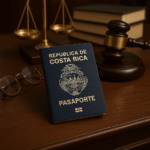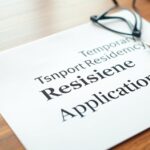Does Costa Rica Residency Provide Access to Latin American Countries?

With a passport ranking among the strongest in the region, Costa Rica opens doors to over 150 nations without visa restrictions. This small Central American nation stands out as a strategic hub for travelers and investors alike.
Known for its political stability and high-quality healthcare system, the country attracts those seeking long-term opportunities. Its residency programs serve as a practical pathway for regional mobility and global exploration.
Four international airports connect residents to major destinations across the Americas and beyond. The country's literacy rate of 97% and robust infrastructure make daily life comfortable for newcomers.
After seven years of maintaining legal status, qualified individuals can pursue full citizenship. This process requires spending just six months per year in the country while enjoying its tropical beauty.
Why Costa Rica Residency Is a Popular Choice
Families and retirees alike are drawn to the country’s reliable healthcare and education systems. Its stable democracy and pristine ecosystems add to the appeal, making it a standout in Central America.
Natural Beauty and Stable Democracy
Lush rainforests and Pacific coastlines create a stunning backdrop for daily life. The country’s 70-year history without a standing army reflects its commitment to peace.
This political stability attracts investors and expats seeking safety. Over 25% of the land is protected, offering residents unmatched access to biodiversity.
High Quality of Life and Healthcare
The Caja Costarricense de Seguro Social (CCSS) provides universal coverage for all legal residents. Contributions start at $230 per month, with tiered plans for families.
Public hospitals have longer wait times but lower costs. Private facilities offer quicker appointments, often preferred by expats. Both maintain high standards of care.
Education is equally robust, with a 97% literacy rate. Top international schools include:
- The British School of Costa Rica (IB curriculum)
- Lincoln School (U.S. accredited)
- CRIA (bilingual programs)
Residency requires children aged 6–15 to attend school. The pensionado visa, popular among retirees, mandates a $1,000 monthly income.
Types of Costa Rica Residency Programs

Legal status options cater to diverse needs, from retirees to digital professionals. Each program has unique financial and lifestyle requirements, simplifying the choice for applicants.
Pensionado (Retiree) Residency
Ideal for retirees, this program requires proof of $1,000 monthly income from pensions or Social Security. The pensionado visa includes healthcare access and tax exemptions on imported household goods.
Rentista (Income-Based) Residency
Applicants must show $2,500 monthly income for two years or a $60,000 deposit in a local bank. This option suits those with steady passive earnings but no pension.
Investor Residency
A $150,000 investment in real estate or businesses qualifies applicants. Fast-track processing makes this popular among entrepreneurs seeking regional opportunities.
Digital Nomad Visa
Remote workers thrive with this one-year renewable option. Proof of $3,000 monthly income and health insurance are mandatory. Co-working hubs in Santa Ana and Escazú cater to global professionals.
Family inclusion requires $4,000 monthly income. Foreign-earned income remains untaxed, adding to the appeal for location-independent workers.
Does Costa Rica Residency Give Me Access to Other Latin American Countries?
Holding legal status here provides more than just tropical living—it’s a gateway to international mobility. The passport ranks #32 worldwide, offering visa-free entry to 150+ nations, including the Schengen Zone.
Regional Travel Perks
Residents enjoy streamlined access across Latin America. Many neighboring nations allow entry with just a national ID card, simplifying cross-border trips for work or leisure.
Passport Power Compared
This document outperforms Panama’s and Colombia’s in global access. Key differences include:
- Schengen Zone entry without visas (90 days)
- E-visa eligibility for Australia and India
- Fast-track immigration lines in 20+ countries
Dual citizenship is fully recognized, letting holders retain original nationality. Consular support extends throughout the region, adding security for travelers.
Benefits of Obtaining Costa Rica Residency

The advantages of becoming a resident extend beyond beautiful landscapes and stable governance. Legal status here offers financial perks, family security, and a straightforward path to citizenship.
Path to Citizenship
After seven years of legal residency, applicants qualify for naturalization. The process requires six months of annual physical presence and basic Spanish proficiency.
Dual citizenship is permitted, letting you retain your original passport. This status grants voting rights and unrestricted property ownership.
Family Inclusion Options
Spouses and children under 25 can be added to most residency programs. Dependent visas require proof of additional income, typically $500 per family member.
Parents of residents may qualify for temporary stays. The healthcare system covers all registered dependents under the primary applicant’s plan.
Tax Advantages
The territorial tax system exempts foreign-earned income. Only local revenue is taxed, making it ideal for remote workers and retirees.
Key fiscal benefits include:
- No capital gains tax on property held for over 3 years
- Double taxation treaties with Germany, Spain, and Canada
- 15% corporate rate for businesses in Free Trade Zones
- Property taxes below 0.25% for homes under $300,000
Explore more about tax benefits for residents. Deductible expenses include business travel and professional training costs.
Step-by-Step Guide to Applying for Residency
Navigating the path to legal status involves clear steps that streamline approval. The process typically takes 6–12 months, with a 98% success rate through CRIE (Immigration Directorate). Proper preparation ensures smooth transitions between phases.
Provisional Visa Application
Start by submitting forms at a consulate abroad or the immigration office. Required documents include a passport copy, police clearance, and proof of income. All foreign paperwork needs apostilles and certified translations.
Fingerprint Registration
After provisional visa approval, visit the CRIE for biometrics. This step locks in your file number for tracking. Deliberate fingerprinting errors cause delays, so follow technician instructions carefully.
Document Submission Process
Submit originals and translations to the immigration registry. Key requirements:
- Apostilled birth certificates (recently issued)
- Health certificates from approved clinics
- Bank statements meeting financial thresholds
Track progress via the online portal using your file number. Final approval triggers a notification for card pickup at designated locations. Permanent residency cards arrive within 30 days of approval.
Temporary vs. Permanent Residency
Legal status comes in two forms, each with distinct benefits and requirements. Temporary residency suits those testing life in the country, while permanent status offers long-term stability. Both paths require meeting specific criteria.
Requirements for Temporary Residency
Applicants must prove financial stability, clean criminal records, and health insurance. Temporary status lasts three years and allows stays of up to six months per year outside the country.
Key conditions include:
- Absence limits: No more than 180 days abroad annually
- Economic solvency: Annual income recertification
- Fee structure: $200–$500 depending on visa type
Transitioning to Permanent Residency
After three years of temporary status, applicants can upgrade to permanent residency. This process involves reapplying with updated documentation and attending an immigration interview.
Critical steps include:
- Submitting fresh police clearances from your home country
- Providing proof of continued financial stability
- Passing a basic Spanish language assessment
Successful applicants gain the right to work freely and access streamlined residency process renewals. Permanent status also reduces physical presence requirements, making it ideal for global citizens.
Many choose this path to eventually apply for citizenship, turning their adopted country into a true home.
Financial Requirements for Each Residency Type
Financial planning is crucial when considering legal status options in this Central American nation. Different programs have specific economic thresholds that applicants must meet. Understanding these requirements helps streamline the application process.
Minimum Income Thresholds
The pensionado program requires $1,000 monthly from pensions or Social Security. Rentista applicants need $2,500 monthly for two years or a $60,000 bank deposit.
Digital nomads must prove $3,000 monthly income. Family inclusion raises this to $4,000. These figures help maintain the country's stable economy.
Investment Amounts for Investors
Real estate investments start at $150,000 in approved properties. Business ventures require $200,000 minimum in qualified enterprises.
Key financial considerations include:
- Property valuations must use certified appraisers
- TIM export certifications cost approximately $1,200
- Businesses must employ at least five local workers
- Depreciation schedules follow 20-year property cycles
- Capital gains tax applies only to short-term holdings
The investment process includes economic solvency verification. Exit strategies should account for potential tax implications on asset sales.
Required Documents for Residency Application
Preparing the right paperwork is the foundation of a successful residency application. Each category has specific requirements that must be met to avoid delays or rejections.
Legalization and Translation of Documents
Foreign documents need apostilles or consular legalization. Birth certificates, marriage licenses, and police reports must be recent (issued within 6 months).
Certified translations into Spanish are mandatory. Approved translators are listed on the immigration authority’s website. Notarized copies are insufficient—originals or certified duplicates are required.
Background Checks and Health Certificates
Police clearances must cover your entire adult life. FBI checks are preferred for U.S. applicants, while local reports suffice for some countries. Fingerprint cards should be submitted through accredited channels.
Medical exams include:
- Vaccinations: Yellow fever proof for travelers from endemic regions
- Psychological evaluations: Waived for retirees and investors
- Pre-existing conditions: Disclose but don’t disqualify if managed
Enrollment in the CCSS healthcare system is required within 30 days of approval. Private insurance must cover repatriation and emergencies. Policies from abroad often qualify if they meet local standards.
Navigating Costa Rica's Immigration Laws
Over 34% of applications face rejection due to avoidable document errors. The process demands precision, from financial proofs to certified translations. Missing a single requirement can delay approval for months.
Working with Immigration Attorneys
Experienced immigration attorneys simplify complex paperwork. They ensure documents meet current standards and deadlines. This saves time and reduces stress during the application process.
Common Pitfalls to Avoid
Outdated passport copies top the list of rejected documents. Always use versions valid for at least six months. Miscalculated income thresholds also trigger denials—double-check financial requirements.
Unapproved translation services delay processing. Only use translators listed by immigration authorities. Missed biometric appointments reset your waiting time. Schedule reminders for these critical steps.
Overstaying during processing incurs penalties. Track visa expiration dates closely. Addressing these issues upfront streamlines approval.
Living in Costa Rica: What to Expect
Newcomers quickly discover a balanced lifestyle combining modern conveniences with natural beauty. The healthcare and education systems meet international standards while maintaining local character. Residents enjoy accessible services amid lush landscapes and vibrant communities.
Cost of Living Comparisons
Monthly expenses typically run 30% lower than U.S. averages. A family of four spends about $2,500 comfortably outside tourist areas. Housing costs vary significantly between urban centers and rural regions.
Healthcare and Education Systems
The CCSS provides universal coverage with wait times averaging 2-4 weeks for specialists. Private clinics offer same-day appointments at higher costs. Both systems maintain emergency response teams with 15-minute urban response targets.
Fifty-six International Baccalaureate schools serve expat families. Special needs programs operate in major cities with trained staff. University admission requires a high school diploma and entrance exams for most programs.
Dental care covers basic procedures under the public system. Alternative medicine practitioners must register with the health ministry. These options give residents comprehensive care choices for all family members.
Travel and Connectivity from Costa Rica
Modern infrastructure makes daily commutes efficient across diverse landscapes. Residents enjoy 92% paved road coverage, linking mountain towns to Pacific beaches with ease.
International Airports and Routes
Four major airports offer direct flights to 30+ global destinations. Juan Santamaría International handles 80% of traffic, with 15-minute processing times for pre-checked passengers.
Regional hubs like Liberia International serve North American routes. Business travelers benefit from daily connections to Miami, Houston, and Panama City.
Local Transportation Options
The public bus system covers 85% of urban areas for under $1 per ride. Ride-share apps operate in all provinces, with 24/7 availability in San José.
Key transit insights:
- Driver’s licenses: Convert foreign licenses within 90 days via written exam
- Car rentals: Mandatory $20/day insurance covers collision damage
- Bike lanes: Protected paths span 120km in metropolitan areas
- Ferries: Puntarenas-Paquera route crosses the Gulf in 1.5 hours
From home to business districts, eco-friendly taxis and electric scooters provide last-mile solutions. Real-time tracking apps help plan optimal routes during peak hours.
Business and Investment Opportunities
Entrepreneurs find fertile ground for growth in this Central American hub. The economy thrives on tourism, tech, and sustainable ventures. Supportive policies and a bilingual workforce attract global investors.
Real Estate Market Overview
Property values have risen steadily, with coastal areas seeing 5–7% annual growth. Residential and commercial markets cater to diverse budgets. Foreign buyers enjoy the same ownership rights as locals.
Key factors to consider:
- Legal structures: SA (corporations) vs. Ltda (LLCs) for asset protection
- Tax benefits: No capital gains tax after 3 years of ownership
- Zoning laws: Coastal properties may have restricted development
Starting a Business
The registration process takes just three days for most entities. Free Trade Zones offer 15% corporate tax rates and import duty exemptions. These zones require 80% local employment, boosting community development.
E-commerce businesses benefit from modern infrastructure. Local partners are optional but ease market entry. With 92% internet coverage, digital ventures scale efficiently.
Conclusion
Choosing legal status here unlocks both regional mobility and long-term security. Over 10% of residents are expats, drawn by streamlined processes and a 20-year track record of stability.
Holders enjoy visa-free travel across Latin America and beyond. The nation’s safety and infrastructure outshine many neighbors, making it a strategic base.
Emerging sectors like renewable energy and tech offer fresh opportunities. Full citizenship becomes possible after seven years, blending global access with local roots.
Ready to explore your options? Consult experts to navigate the process smoothly.


